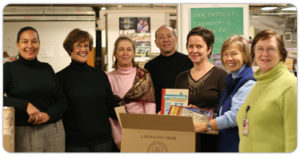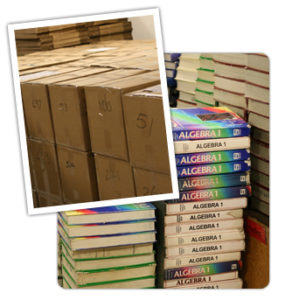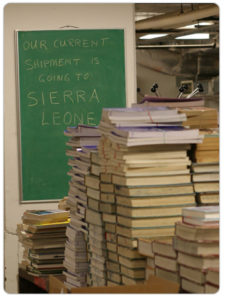
Most Bank projects have a designated life cycle, with results that can be difficult to measure. One project that is long-lived and produces measurable results is the World Bank Family Network Book Project.
Founded in 1982, it has shipped two and a half million books to more than 100 countries. And above all, it is a labor of love staffed completely by volunteers
The Book Project began when spouses of Bank employees recognized the need for books in developing countries and decided to do something about it, explains the current President, Josephine Barry, whose husband works with the IFC.
“It was a very small project initially—the first shipment of a few books was to Nigeria—but over the years it has grown and now ships one hundred thousand books every year to countries around the world,” Barry explained.
The Book Project focuses on Africa, Latin America, Asia, and until quite recently some countries in Eastern Europe.
High Volume Shipments
 “At the moment we send a minimum of 25,000 books in each container,” Barry explained. “We are pushing it up. The Book Project shipped 29,000 books to the Philippines last year, and an equal number is about to head to Sierra Leone where two thousand schools applied for books, with Kenya next in the queue.”
“At the moment we send a minimum of 25,000 books in each container,” Barry explained. “We are pushing it up. The Book Project shipped 29,000 books to the Philippines last year, and an equal number is about to head to Sierra Leone where two thousand schools applied for books, with Kenya next in the queue.”
Several factors determine who gets books. Enough schools and institutions in the country must formally request books, and there must be enough books in the Book Project warehouse or in the pipeline to meet the request. Presently the Book Project does not process requests from landlocked countries—except under special arrangement—because of the cost of shipping books from the port.
Cooperative Distribution
The World Bank pays for the shipment of books from Washington to port of entry. The distributor then has to get the books through customs and to the designated schools and libraries.
A crucial cog is reliable distributors in recipient countries who have to pay for the cost of internal distribution. “We are careful about whom we choose,” Barry said, citing cases in the past when some unscrupulous distributors in a few countries tried to charge schools for the books. Now distributors are validated before they are entrusted with books.
Barry said that in the recent shipment to the Philippines, the Book Project relied on a Franciscan religious order that runs many schools in the country, and in Belize they worked with the Head Librarian of the National Library and with the local Peace Corps Office. In India and Jamaica, the books have been distributed internally by prominent local business people. Books destined for Kenyan schools in 2007 will be handled by the Kenya World Bank Staff Association.
For landlocked states, delivery costs are usually prohibitive. Recently the Book Project shipped books by special arrangement to landlocked Burkina Faso. The public affairs officer at the American Embassy in the country kindly agreed to receive the books in Lome, Togo and to arrange the shipment onward to Ouagadougou.
Lack of Books for French System
 The Book Project does not usually have the books to respond requests from countries that follow the French style baccalaureate system of education. “This is because the main sources of the Book Project’s books are America and Canada,” Josephine said. “We do get some Spanish books because of the number of Spanish speakers here in America,” she added and “French books from Canada are available for French speaking countries, such as Haiti, that do not follow the baccalaureate system.”
The Book Project does not usually have the books to respond requests from countries that follow the French style baccalaureate system of education. “This is because the main sources of the Book Project’s books are America and Canada,” Josephine said. “We do get some Spanish books because of the number of Spanish speakers here in America,” she added and “French books from Canada are available for French speaking countries, such as Haiti, that do not follow the baccalaureate system.”
For this reason the Book Project relies on small shipments, the shipping costs of which are met by sponsors either in the US or in the destination country. “This means when we do have a small number of books in French we can get them to schools that can use them,” Barry said.
Continuing Need for Textbooks at all Levels
The Book Project relies almost entirely on donations, and it has a permanent appeal out for textbooks for all levels from age 5 to 18. Publishers such as the Oxford University Press support the Book Project by giving books at a discount. The Book Project does not accept or ship books on religion, politics or American history. Donated books that are unsuitable for use in schools are sold at low prices to Bank staff and the proceeds, augmented by a yearly $10,000 grant from the IMF Community Program, are used to purchase atlases, grammar books, dictionaries, and other needed books.
How to Get Involved
The Book Project serves as an important networking center for Bank spouses and provides an outlet for them. On Monday, Tuesday, and Wednesday from 10:00 am–3:00 pm, a team of spouses is busily working away. “The whole operation has been run by volunteers and with donated books for 25 years,” Barry observed, looking forward to the next 25 years.
This article was originally published on the World Bank Intranet. Contributed by John Mulaa, EXTCC.
